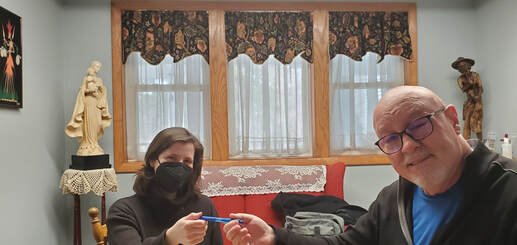 Interfaith literacy not only provides opportunities to learn of the depth of other faiths through our friendships, but also helps us to understand the extraordinary diversity within anyone of our religious traditions. Rabbi Mimi Micner, one of our dialogue partners from Temple Beth Torah, provided such a lesson to me. Prior to the start of Passover, she asked me to buy the temple's "chametz" in preparation of Passover. I said, "Sure, what's that?" Rabbi Mimi related that the Torah and Rabbinical teaching speak of the need to get rid of all foods that use grain, or suspected foods that do. On the holiday of Passover, the Torach says we are not to have any chametz in our possession (Exodus 12:19 and 13:7). Any food that is made out of grain that has been allowed to rise (ferment) is chametz. Common chametz items include bread, cakes, breakfast cereals, pastas, many liquors and more. This also applies to chametz that is locked up and out of sight. The Talmud, commenting on the Torah, begins a conversation about the laws around removing chametz from one's home and from there, the medieval-era drafters of Jewish law took the conversation of the Talmud and ruled that Jews would be able to remove chametz from their home through selling their chametz to people who are not Jewish and then get it back at the end of the holiday. Close to the eve of Passover, Rabbi Mimi and I met and read together a formal agreement for the selling of chametz. In this agreement, I not only agreed to buy her chametz, but Rabbi Mimi has the authority to sell on a special list, Harsha'ah, the chametz of others. In the ritual of the signing of this agreement, it is sealed not only with signatures, but also by means of kinyan sudar, by means of a handshake and the ritual lifting of the pen together that we both use to sign the document. Here our agreement is binding until her return also through the purchase price of one dollar, by way of Vemno of course. What seems like simple rituals for Passover, is something that connects Jews to their past and the Word of God that binds them together. As a Catholic priest, we are indebted to our Jewish neighbors and the gift of Judaism that is at the heart of so much of what we Christians treasure. The late Pope John Paul II once called our Jewish friends, our "elder brothers and sisters in faith."
0 Comments
Leave a Reply. |
AuthorFr. Carl Chudy Archives
June 2024
Categories |
 RSS Feed
RSS Feed